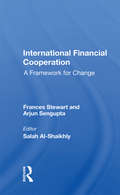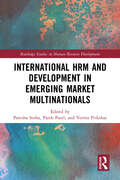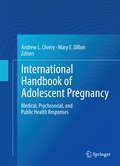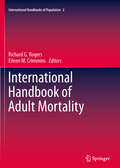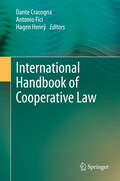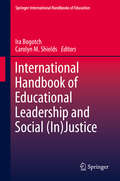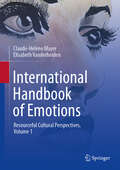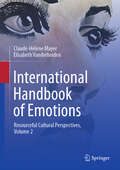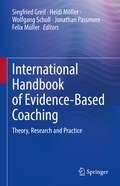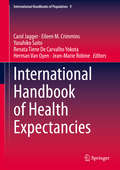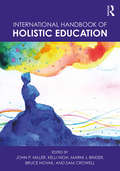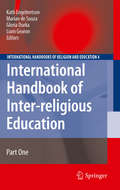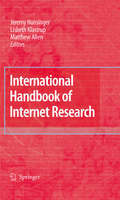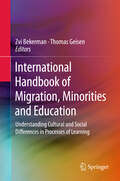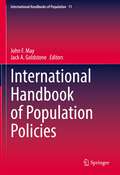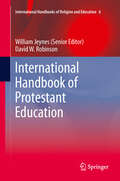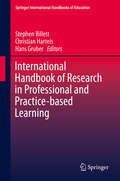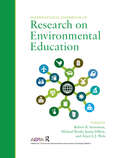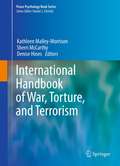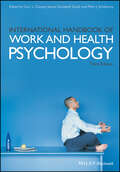- Table View
- List View
International Financial Cooperation: A Framework For Change
by Frances StewartThis book presents papers on the recycling of funds from surplus to deficit countries; stabilizing the existing International Financial System; securing an adequate level of investment return for surplus countries; the role of the special drawing rights; and mineral and energy financing.
International Financial Integration
by Anthony M. EndresDrawing on prominent contributions by economists to the debate on international monetary reform, this book provides an historical perspective on the plans, schemes and ideas on the international financial system.
International HRM and Development in Emerging Market Multinationals (Routledge Studies in Human Resource Development)
by Paresha SinhaEmerging multinational enterprises (or EMNEs) have made a huge impact on the international business stage by internationalising at a rapid rate. And they have performed remarkably well in both developing and developed countries. Accordingly, there is a growing strand of literature on how EMNEs manage their international human resource (IHRM) practices in different international contexts. However, the majority of the literature on IHRM practices of EMNEs is limited to explaining what international management practices EMNEs implement in their foreign subsidiaries and how they implement them. Too often, EMNEs struggle to transfer their weak management practices across national borders as they have limited experience, resources and capabilities when compared to MNEs from developed countries. Developing a better understanding on the manner in which EMNEs adopt their international human resource management and development practices abroad is, therefore, paramount to fully understand their globalisation-related behaviours. This dedicated book will aim to provide a holistic picture and contemporary insights on IHRM in emerging multinational enterprises. It will be of interest to researchers, academics and students in the fields of business and management, especially those with a particular interest in human resource management, firm internationalisation and emerging markets.
International Handbook of Adolescent Pregnancy
by Andrew L. Cherry Mary E. DillonThe rates are on the decline worldwide. But adolescent pregnancies still occur, placing millions of girls each year at risk for medical complications and social isolation and their babies for severe health problems-especially when prenatal care is inadequate or nonexistent. But as the opportunity for young women and girls increases around the world, adolescent pregnancy will continue to decline. Featuring reports from countries across the developed and developing worlds, the International Handbook of Adolescent Pregnancy analyzes the scope of the problem and the diversity of social and professional responses. Its biological/ecological perspective identifies factors influencing childhood pregnancy, as well as outcomes, challenges and needs of very young mothers as they differ across nations and regions. Salient comparisons are made as cultural contexts and community support vary widely and attention is paid to issues such as child marriage, LGBT concerns and the impact of religion and politics on health care, particularly access to contraception, abortion and other services. This global coverage heightens the understanding of readers involved in care, education and prevention programs and otherwise concerned with the psychosocial development, reproductive health and general well-being of girls. Included in the Handbook: Biological influences of adolescent pregnancy. Adolescent maternal health and childbearing. Adolescent pregnancy and mental health. International perspectives on adolescent fathers. Adolescent pregnancy as a feminist issue. Adolescent pregnancy as a social problem. Plus viewpoints from more than thirty countries. As a unique source of up-to-date findings and clear-headed analysis, the International Handbook of Adolescent Pregnancy is a go-to reference for practitioners and researchers in maternal and child health, pediatrics, adolescent medicine and global health.
International Handbook of Adult Mortality
by Eileen M. Crimmins Richard G. RogersThis handbook presents a comprehensive and up-to-date overview of unprecedented substantive, theoretical, methodological, and statistical developments and insights, and an in-depth examination of trends and patterns, in adult mortality around the world. With over two dozen chapters and more than 50 authors, this volume draws from top international mortality experts to provide one of the best overviews of life expectancy extant. The book documents remarkable gains in life expectancy, which stand out as one of the most important accomplishments of the twentieth century. Individuals in more developed countries can expect to live longer now than ever before, especially the Japanese who enjoy record-setting life expectancies. The book also explores unfortunate declines in life expectancy in selected countries brought on by such factors as infectious diseases; accidents, suicides, and homicides; and political and economic conflict and turmoil. This book synthesizes the wealth of mortality information available, clearly articulates the central findings to-date, identifies the most appropriate datasets and methods currently available, illuminates the central research questions, and develops an agenda to address these research questions. The authors carefully examine central factors related to mortality, including health behaviors, socioeconomic status, social relations, biomarkers, and genetic factors. The book will prove especially relevant to researchers, students, and policy makers within social and health sciences who want to better understand international trends and patterns in adult mortality.
International Handbook of Anger
by Gerhard Stemmler Charles Spielberger Michael PotegalBook covers a broader range of topics than other books in this area. Notably, extensive coverage of the neurobiology of anger in context of psychology and sociology is unique. Book provides broad, integrative coverage while avoiding unnecessary duplication. Contributors have read each others' chapters and there is extensive cross-referencing from chapter to chapter. Book contains a guide to content and organization of chapters and topics, along with interpolated commentary at the end of each section.
International Handbook of Chinese Families
by Chan Kwok-BunFamilies are the cornerstone of Chinese society, whether in mainland China, in Taiwan, Hong Kong, Macao, Singapore, Malaysia, or in the Chinese diaspora the world over. Handbook of the Chinese Family provides an overview of economics, politics, race, ethnicity, and culture within and external to the Chinese family as a social institution. While simultaneously evaluating its own methodological tools, this book will set current knowledge in the context of what has been previously studied as well as future research directions. It will examine inter-family relationships and politics as well as childrearing, education, and family economics to provide a rounded and in-depth view.
International Handbook of Cooperative Law
by Dante Cracogna Antonio Fici Hagen HenrÿThe degree of development reached by cooperatives of different sectors throughout the world, which among others led to the UN declaring 2012 as the International Year of Cooperatives, needs to be accompanied by a similar development of corresponding legislation. To this end, a better knowledge of cooperative law from the comparative point of view, as has already been established for other types of enterprises, becomes of great importance. This book strives to fill this gap, and is divided into four parts. The first part offers an analytic and conceptual framework with which to understand, study and assess cooperative law from a transnational and comparative perspective. The second part includes several chapters dealing with attempts to harmonize cooperative laws. The third part contains an overview of more than 30 national cooperative laws, while the last part summarizes and compares these national cooperative laws, thus laying the foundation for a comparative cooperative law doctrine.
International Handbook of Educational Leadership and Social (In)Justice
by Ira Bogotch Carolyn M. ShieldsThe International Handbook on Educational Leadership and Social (In)Justice creates a first-of-its-kind international forum on conceptualizing the meanings of social justice and leadership, research approaches in studying social justice and combating social injustices, school, university and teacher leadership for social justice, advocacy and advocates for social justice, socio-cultural representations of social injustices, glocal policies, and leadership development as interventions. The Handbook is as much forward-looking as it is a retrospective review of educational research literatures on social justice from a variety of educational subfields including educational leadership, higher education academic networks, special education, health education, teacher education, professional development, policy analyses, and multicultural education. The Handbook celebrates the promises of social justice while providing the educational leadership research community with concrete, contextualized illustrations on how to address inequities and combat social, political and economic injustices through the processes of education in societies and educational institutions around the world.
International Handbook of Emotions: Resourceful Cultural Perspectives, Vol. 1
by Elisabeth Vanderheiden Claude-Hélène MayerThis two-volume handbook reimagines the role of emotions, offering transformative insights into their significance for individuals, communities, and societies. Volume 1 combines rigorous theoretical exploration, personal narratives, and cutting-edge research to explore the intricate connections between emotions, human development, and positive psychology. Far beyond the confines of emotional well-being, this volume examines the transformative power of emotions in shaping identities and driving personal and collective growth. Through its comprehensive approach, it paints a vivid picture of the human emotional experience while navigating diverse cultural contexts and intergenerational dynamics. This work challenges conventional approaches by integrating perspectives from various cultural backgrounds and cross-cultural experiences, offering readers a deeper understanding of how emotions influence relationships, decision-making, and societal change. It is an indispensable resource for psychologists, researchers, educators, and practitioners aiming to expand their knowledge of emotions in a global context and apply innovative frameworks in their work. Through its synthesis of theory and practice, the handbook invites readers to rethink the emotional dimensions of human experience. It encourages the exploration of new paradigms that highlight the transformative potential of emotions and their ability to shape inclusive and emotionally intelligent communities. This volume is more than a collection of knowledge—it is a call to action for those who seek to understand and harness the transformative potential of emotions. Whether exploring the role of emotions in culturally diverse and transcultural understanding or their impact on personal growth, this handbook opens new pathways for academic inquiry and practical application, redefining how we perceive and engage with the emotional fabric of our world. <span lang="EN-US" style="mso-fareast-font-family: 'Times New Roman'; mso-bidi-font-family: Calibri; mso-bidi-theme-font: minor-latin;
International Handbook of Emotions: Resourceful Cultural Perspectives, Vol. 2
by Elisabeth Vanderheiden Claude-Hélène MayerVolume 2 of this two-volume handbook extends the foundational understanding of emotional well-being through the lens of positive psychology into the realms of cultural diversity, societal impacts, and the influence of technology. This volume offers an in-depth examination of the societal impact of emotions, cultural interpretations, and the emerging significance of digital and robotic interactions with emotions. It encompasses a wide range of topics, including the effects of global crises on emotional well-being, the role of art and literature in understanding emotions, and the future of emotional intelligence in the age of digital technology. Studies featured in this Volume 2 provide insight into emotional experiences across diverse cultures, the resilience of immigrants and refugees, and the psychological dynamics of collective behaviour, alongside considerations of how technology is reshaping our emotional lives. The volume stands as a critical academic resource, enriching the discourse on the global and transcultural dimensions of emotional well-being. It highlights the pivotal role of cultural and technological considerations in advancing our understanding of emotions and sets a new benchmark for research and practice in the field. Aimed at scholars, researchers, and practitioners in psychology, cultural studies, and technological innovation, this volume also addresses educators, policymakers, and anyone with a keen interest in understanding the complex interplay between emotion, culture, and technology. By bridging gaps between disciplines, this volume fosters a more comprehensive and nuanced understanding of emotional well-being across different cultural contexts and technological environments. It prompts interdisciplinary dialogue, offering evidence-based insights for mental health practices, educational strategies, and policymaking. Emotion science has progressed enormously in the last decade. For those wishing to get insight into the depth and breadth of this progress, this is a terrific, edited 2 volume overview, brought together by two internationally recognised emotion researchers. It takes a biopsychosocial approach exploring the multiple dimensions of emotion science and how it can be applied to many different aspects of human life from therapy through to the organisation of communities. It will be a must have book for anyone interested in understanding the complexities of emotions.  
International Handbook of Evidence-Based Coaching: Theory, Research and Practice
by Jonathan Passmore Heidi Möller Wolfgang Scholl Felix Müller Siegfried GreifThis handbook comprehensively covers the fundamental key concepts in coaching research and evidence-based practice and shows how coaching can be applied to multiple contexts. It provides coaching scholars, researchers and practitioners with detailed review of the key concepts, research and new insights into coaching research and practice. This key reference work includes over 70 contributions from more than 110 leading researchers and practitioners in the field across countries, and deftly combines theory with case studies and applications from psychology, sociology, business administration, organizational studies, education, and communication studies. This handbook, edited by the top scholars in the field, is meant for an academic as well as a professional readership, and is an invaluable resource for coaches, clients, coaching institutes and associations, and students of coaching.
International Handbook of Health Expectancies (International Handbooks of Population #9)
by Eileen M. Crimmins Jean-Marie Robine Carol Jagger Yasuhiko Saito Renata Tiene De Carvalho Yokota Herman Van OyenThis handbook presents global research on health expectancies, a measure of population health that examines the interaction between quantity and quality of life. With data from Europe, North America, Asia, and beyond, it explains how to define and measure health and morbidity and how to integrate these measurements with mortality. Coverage first highlights long-term trends in longevity and health. It also considers variations across and within countries, inequalities, and social gaps as well as micro and macro-level determinants. Next, the handbook deals with the methodological aspects of calculating health expectancies. It compares results from different methods and introduces tools, such as decomposition tool for decomposing gaps, an attrition tool for attributing a medical cause to reported disability, and a tool for measuring policy impact on health expectancies. It introduces methods of forecasting health expectancies. The handbook then goes on to examine the synergies and/or trade-off between longevity and health as well as considers such topics as the compression versus the expansion of morbidity/disability and the health-survival paradox. The last section considers new concepts and dimensions of health and, more broadly, well being which can be used in summary measures of population health, including psychological factors. Researchers, clinicians, demographers, and health planners will find this handbook an essential resource to this increasingly important public health and social policy tool. It will help readers gain insight into changes in health over time as well as inequalities between countries, regions, and population subgroups.
International Handbook of Holistic Education
by John P. Miller Marni J. Binder Kelli Nigh Bruce Novak Sam CrowellProviding a comprehensive overview of holistic education’s history, conceptions, practices, and research, this Handbook presents an up-to-date, global picture of the field. Organized in five sections, the Handbook lays out the field’s theoretical and historical foundations; offers examples of holistic education in practice with regard to schools, programs, and pedagogies at all levels; presents research methods used in holistic education; outlines the growing effort among holistic educators to connect holistic teaching and learning with research practice; and examines present trends and future areas of interest in program development, inquiry, and research. This volume is a must-have resource for researchers and practitioners and serves as an essential foundational text for courses in the field.
International Handbook of Inter-religious Education
by Kath Engebretson Gloria Durka Marian De Souza Liam GearonThis Handbook has the potential to redress the distortion of information about particular religions, to add to understanding about what religions have in common, and to suggest how they can work together for justice and peace. In the present day there is a vital resurgence of interest in religions, with new movements emerging from long established religious traditions. There is also, around the world, a growing sense of the need to preserve indigenous religions, even when these have accommodated to imported traditions. The Handbook gives a voice to this resurgence of interest, and addresses inter-religious education from a range of religious viewpoints and contexts. The publication is very timely especially in light of the need for religions of the world to together contemplate and actively promote human rights, social justice and peace, for religions have a specific mandate for this.
International Handbook of Internet Research
by Lisbeth Klastrup Matthew Allen Jeremy HunsingerThis handbook, the first of its kind, is a detailed introduction to the numerous academic perspectives we can apply to the study of the internet as a political, social and communicative phenomenon. Covering both practical and theoretical angles, established researchers from around the world discuss everything: the foundations of internet research appear alongside chapters on understanding and analyzing current examples of online activities and artifacts. The material covers all continents and explores in depth subjects such as networked gaming, economics and the law. The sheer scope and breadth of topics examined in this volume, which ranges from on-line communities to e-science via digital aesthetics, are evidence that in today's world, internet research is a vibrant and mature field in which practitioners have long since stopped considering the internet as either an utopian or dystopian "new" space, but instead approach it as a medium that has become an integral part of our everyday culture and a natural mode of communication.
International Handbook of Jewish Education
by Alex Pomson Lisa D. Grant Helena MillerThe International Handbook of Jewish Education, a two volume publication, brings together scholars and practitioners engaged in the field of Jewish Education and its cognate fields world-wide. Their submissions make a significant contribution to our knowledge of the field of Jewish Education as we start the second decade of the 21st century. The Handbook is divided broadly into four main sections: Vision and Practice: focusing on issues of philosophy, identity and planning -the big issues of Jewish Education.Teaching and Learning: focusing on areas of curriculum and engagementApplications, focusing on the ways that Jewish Education is transmitted in particular contexts, both formal and informal, for children and adults.Geographical, focusing on historical, demographic, social and other issues that are specific to a region or where an issue or range of issues can be compared and contrasted between two or more locations.This comprehensive collection of articles providing high quality content, constitutes a difinitive statement on the state of Jewish Education world wide, as well as through a wide variety of lenses and contexts. It is written in a style that is accessible to a global community of academics and professionals.
International Handbook of Migration, Minorities and Education
by Zvi Bekerman Thomas GeisenMigrants and minorities are always at risk of being caught in essentialized cultural definitions and being denied the right to express their cultural preferences because they are perceived as threats to social cohesion. Migrants and minorities respond to these difficulties in multiple ways -- as active agents in the pedagogical, political, social, and scientific processes that position them in this or that cultural sphere. On the one hand, they reject ascribed cultural attributes while striving towards integration in a variety of social spheres, e.g. school and workplace, in order to achieve social mobility. On the other hand, they articulate demands for cultural self-determination. This discursive duality is met with suspicion by the majority culture. For societies with high levels of migration or with substantial minority cultures, questions related to the meaning of cultural heterogeneity and the social and cultural limits of learning and communication (e.g. migration education or critical multiculturalism) are very important. It is precisely here where the chances for new beginnings and new trials become of great importance for educational theorizing, which urgently needs to find answers to current questions about individual freedom, community/cultural affiliations, and social and democratic cohesion. Answers to these questions must account for both 'political' and 'learning' perspectives at the macro, mezzo, and micro contextual levels. The contributions of this edited volume enhance the knowledge in the field of migrant/minority education, with a special emphasis on the meaning of culture and social learning for educational processes.
International Handbook of Philosophy of Education (Springer International Handbooks of Education)
by Paul SmeyersThis handbook presents a comprehensive introduction to the core areas of philosophy of education combined with an up-to-date selection of the central themes. It includes 95 newly commissioned articles that focus on and advance key arguments; each essay incorporates essential background material serving to clarify the history and logic of the relevant topic, examining the status quo of the discipline with respect to the topic, and discussing the possible futures of the field. The book provides a state-of-the-art overview of philosophy of education, covering a range of topics: Voices from the present and the past deals with 36 major figures that philosophers of education rely on; Schools of thought addresses 14 stances including Eastern, Indigenous, and African philosophies of education as well as religiously inspired philosophies of education such as Jewish and Islamic; Revisiting enduring educational debates scrutinizes 25 issues heavily debated in the past and the present, for example care and justice, democracy, and the curriculum; New areas and developments addresses 17 emerging issues that have garnered considerable attention like neuroscience, videogames, and radicalization. The collection is relevant for lecturers teaching undergraduate and graduate courses in philosophy of education as well as for colleagues in teacher training. Moreover, it helps junior researchers in philosophy of education to situate the problems they are addressing within the wider field of philosophy of education and offers a valuable update for experienced scholars dealing with issues in the sub-discipline. Combined with different conceptions of the purpose of philosophy, it discusses various aspects, using diverse perspectives to do so. Contributing Editors:Section 1: Voices from the Present and the Past: Nuraan DavidsSection 2: Schools of Thought: Christiane Thompson and Joris VliegheSection 3: Revisiting Enduring Debates: Ann Chinnery, Naomi Hodgson, and Viktor JohanssonSection 4: New Areas and Developments: Kai Horsthemke, Dirk Willem Postma, and Claudia Ruitenberg
International Handbook of Population Policies (International Handbooks of Population #11)
by Jack A. Goldstone John F. MayThis Handbook offers an array of internationally recognized experts’ essays that provide a current and comprehensive examination of all dimensions of international population policies. The book examines the theoretical foundations, the historical and empirical evidence for policy formation, the policy levers and modelling, as well as the new policy challenges. The section Theoretical Foundations reviews population issues today, population theories, the population policies’ framework as well as the linkages between population, development, health, food systems, and the environment. The next section Empirical Evidence discusses international approaches to design and implement population policies on a regional level. The section Policy Levers and Modelling reviews the tools and the policy levers that are available to design, implement, monitor, and measure the impact of population policies. Finally, the section New Policy Challenges examines the recurrent and emerging issues in population policies. This section also discusses prospects for demographic sustainability as well as future considerations for population policies. As such this Handbook provides an important and structured examination of contemporary population policies, their evolution, and their prospects.
International Handbook of Protestant Education
by William Jeynes David W. RobinsonSince their earliest days, institutions providing a Protestant education have always been respected and sought-after for their rigor and relative freedom from dogma--and despite today's secularism and plurality, they remain so. This international handbook is the ultimate companion to protestant schooling worldwide. Its 39 chapters form the most comprehensive and wide-ranging treatment of the subject yet available, addressing Protestant education on all six inhabited continents and featuring the perspectives of leading authorities and public figures. The contributions cover in detail not only the facts and features of Protestant schooling in sundry nations, but also integrate a range of themes common to them all, themes so vital that they are of central concern to Christians around the world and of whatever denomination. Some of these topics are school choice, globalization, Bible pedagogy and character education, the fine arts, parental involvement, and the rise of Christianity in previously inaccessible locations such as China. The handbook's stellar list of authors is a Who's Who of authorities on the subject and includes a renowned American evangelical, a former historian of the US House of Representatives, and White House consultants responsible for framing legislation. The many contributors from outside the USA are leading academics conducting seminal research on numerous topics in the field. Both exhaustive and authoritative, The International Handbook of Protestant Educationwill be an invaluable asset to educators, ministers, parents, policy makers political leaders of any denomination--or none.
International Handbook of Research in Professional and Practice-based Learning
by Stephen Billett Christian Harteis Hans GruberThe International Handbook of Research in Professional and Practice-based Learning discusses what constitutes professionalism, examines the concepts and practices of professional and practice-based learning, including associated research traditions and educational provisions. It also explores professional learning in institutions of higher and vocational education as well the practice settings where professionals work and learn, focusing on both initial and ongoing development and how that learning is assessed. The Handbook features research from expert contributors in education, studies of the professions, and accounts of research methodologies from a range of informing disciplines. It is organized in two parts. The first part sets out conceptions of professionalism at work, how professions, work and learning can be understood, and examines the kinds of institutional practices organized for developing occupational capacities. The second part focuses on procedural issues associated with learning for and through professional practice, and how assessment of professional capacities might progress. The key premise of this Handbook is that during both initial and ongoing professional development, individual learning processes are influenced and shaped through their professional environment and practices. Moreover, in turn, the practice and processes of learning through practice are shaped by their development, all of which are required to be understood through a range of research orientations, methods and findings. This Handbook will appeal to academics working in fields of professional practice, including those who are concerned about developing these capacities in their students. In addition, students and research students will also find this Handbook a key reference resource to the field.
International Handbook of Research on Environmental Education
by Justin Dillon Robert B. Stevenson Michael Brody Arjen E.J. WalsThe environment and contested notions of sustainability are increasingly topics of public interest, political debate, and legislation across the world. Environmental education journals now publish research from a wide variety of methodological traditions that show linkages between the environment, health, development, and education. The growth in scholarship makes this an opportune time to review and synthesize the knowledge base of the environmental education (EE) field. The purpose of this 51-chapter handbook is not only to illuminate the most important concepts, findings and theories that have been developed by EE research, but also to critically examine the historical progression of the field, its current debates and controversies, what is still missing from the EE research agenda, and where that agenda might be headed. Published for the American Educational Research Association (AERA).
International Handbook of War, Torture, and Terrorism
by Kathleen Malley-Morrison Denise Hines Sherri MccarthyInternational Handbook of Reconciliation and Negotiation follows up on the research gathered from the PAIRTAPS (Perspectives on Govermental Aggression and Peace) survey that was administered in over 40 countries worldwide. Where the International Handbook of Government Aggression and Peace focuses on governmental acts of aggression and violence, this book highlights the many actions taken worldwide to secure the rights of individuals to peace and protest, as examined from a theoretical standpoint. The book has both a theory base as well as empirical findings that should appeal to researchers across several disciplines including peace psychology, political science, and sociology.
International Handbook of Work and Health Psychology
by Cary L. Cooper James C. Quick Marc J. SchabracqNow in its third edition, this authoritative handbook offers a comprehensive and up-to-date survey of work and health psychology. Updated edition of a highly successful handbook Focuses on the applied aspects of work and health psychology New chapters cover emerging themes in this rapidly growing field Prestigious team of editors and contributors
